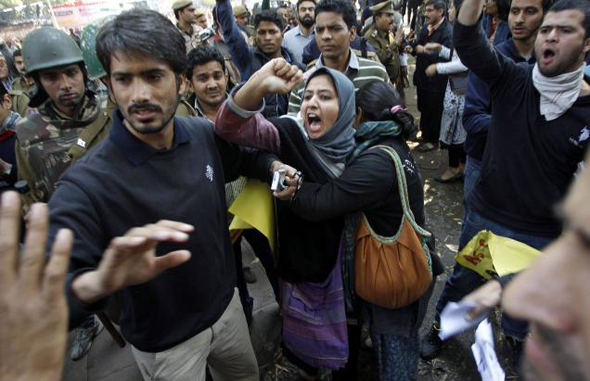Srinagar, Feb 10: An angry Jammu and Kashmir Chief Minister Omar Abdullah today slammed the execution of Afzal Guru and said this would reinforce a sense of alienation and injustice among generations of youth in the Valley.

Omar also said it was a "tragedy" that Guru was not allowed to meet his family before he was hanged and not allowed a "final farewell". The 43-year-old Parliament attack convict was hanged and buried in Tihar jail premises in Delhi in a secret operation yesterday.
Clearly unhappy with the hanging of Guru, the Chief Minister said there were many questions that needed to be answered.
Omar observed that the long-term implications of the hanging of Guru's hanging were "far more worrying" as they were related to the new generation of youth in Kashmir "who may not have identified with Maqbool Bhatt but will identify with Afzal Guru." Bhat was hanged in 1984 for murder of Indian diplomat Ravindra Mhatre in the UK.
"Please understand that there is more than one generation of Kashmiris that has come to see themselves as victims, that has come to see themselves as category of people who will not receive justice," Omar said in TV interviews.
"Whether you like it or not, the execution of Afzal Guru has reinforced that point that there is no justice for them and that to my mind is far more disturbing and worrying than the short-term implications for security front.
How we would be able to correct or address that sense of injustice and alienation is a question I do not have answers," he added.
Asked about the official position of the ruling National Conference on the hanging, Omar said," Obviously we would have it rather had not happened."

Kashmiri students protest the execution of Mohammed Afzal Guru, in New Delhi on Saturday
Expressing himself against death penalty because “I have no bloodlust". Omar said as long as the capital punishment exists on the statute there should be no "pick and choose".
Asked whether the UPA government went for selective execution of death row convicts by hanging Guru, Omar said it will have to be proved to Kashmiris and to the world that the execution of Afzal Guru is not a "selective" one.
"I had a sense that Afzal Guru would be executed sooner rather than later. Generations of Kashmiris will identify with Afzal Guru. You will have to prove to the world that the death penalty is not used selectively. The onus rests on the judiciary and the political leadership to show that this wasn't a selective execution," he said.
The Chief Minister while agreeing that there were people who believe that Afzal's trial was flawed said there were enough voices in the rest of the country also who feel the same.
Omar said if the Centre wanted to protect itself from allegation that Afzal's hanging was political than legal, it will have to answer questions on other death row convicts.
"There are others on death who are also implicated in attacks on democracy. If Chief Minister of a state not a symbol of democracy? Is a former Prime Minister not a symbol of democracy? Of course, he is," he said referring to the death row convicts in the cases of assassination of former Prime Minister Rajiv Gandhi and Punjab Chief Minister Beant Singh.
Omar also said that many questions needed to be answered.
"The words used in the Supreme Court judgement are difficult to explain ... the judgement talks about satisfying collective conscience. You don't hang someone to satisfy collective conscience but to satisfy the legal requirements," the Chief Minister said.
On Guru's family not allowed to meet him, Omar said, "I cannot reconcile myself to the fact that his (Afzal) family was not allowed to see him before he was killed or executed. That to my mind, on a human level, is the biggest tragedy of this execution."
The Chief Minister also questioned the rationale of informing Afzal's family through post saying the reliability of the medium itself was questionable.
"If we are going to inform someone by post that his family member is going to be hanged, there is something seriously wrong with the system," he said.








Comments
Add new comment